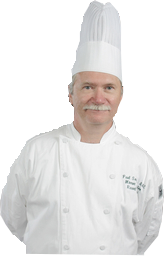
It drives me crazy to see the lack of discipline and respect for the profession of cooking that exists in so many kitchens today. How we maintain our kitchens, care for our uniforms, attend to basic grooming, treat the ingredients that we work with and interact with others defines how others perceive our industry. To some, this may be unimportant, however there are thousands of cooks, chefs and restaurateurs who have dedicated their lives to building up a profession who would disagree.
Let’s begin with the uniform. The cook’s uniform represents so much that may be unknown to most.
“It’s all about pride. If you have it in your profession, you will have it in your uniform, no matter what your walk of life. With the Chef’s uniform, there is more at stake than just keeping the uniform clean and white. A dignified look helps generate a feeling of professionalism. When you don the toque, jacket, checkered pants (black), necktie, apron and side towel, you are continuing centuries old traditions.”
http://www.prueleith.co.za/news/proud-history-of-the-chef%E2%80%99s-uniform/#.Uv4MImRdWgQ
The chef’s hat or toque evolved over time until Chef Escoffier defined how it helped to establish rank in the kitchen. The taller the toque, the higher the position in the kitchen with the executive chef donning the hat with the greatest height. This made it easy for anyone to find those in a position of responsibility. Additionally, the number of pleats on the hat represents a chef’s level of expertise. A classic chefs toque was purported to have 100 pleats representing his or her ability to prepare an egg 100 different ways. The chefs coat with its double breasted flaps has a purpose of adding another layer of protection against burns, a second chance at maintaining cleanliness (reversing the flaps if one side becomes stained during work), and represents the importance of cleanliness in the kitchen. The side towel is not to be used for cleaning, but rather a dry cloth to be used on hot pan handles and removing items from the oven while protecting a cooks hands. Proper shoes are used for support of the most important part of a chef’s body (his or her feet) and are structured to protect against pans that might be dropped on feet during busy service. This long history of the uniform pays respect for all of the chefs who came before. Those who do not understand this might find it justified wearing baseball caps or sweat bands, jackets that seem to emphasize style vs. function, pants that are less about protecting the image of cleanliness and professionalism than something that portrays the desire of a cook to stand out in a crowd and shoes that are best suited for the track or basketball court and less about protection from accidents and 10-12 hours of work on your feet. Every time that a cook ignores the traditions associated with the pride behind a uniform he or she diminishes the perception that the world has about the profession of cooking.
How we treat the equipment in our kitchens, the physical plant, and the ingredients that we work with sets the tone for the respect that others have for what we do. Cleanliness of facilities and proper maintenance of equipment is critical to the function of a kitchen team. A clean kitchen is a proud kitchen and a proud kitchen produces better food. The farmer invests his or her life to grow the crops that wind up in restaurant coolers. If a cook spent even one full day working on a farm he or she would likely approach those carrots, onions and potatoes in a much different way. Proper storage, handling, cleaning, cutting and cooking demonstrate respect for the farmer as well as the ingredient. It is appalling to see how little respect many cooks have for those precious ingredients that we are privileged to handle.
Finally, if a cook wants to receive respect for what he or she does, if they want to be able to hold their head high when someone asks what they do for a living, if they want opportunities to grow within their profession and reach a level of earning that allows them to provide adequately for their families then they must learn how to show respect for the people they work with and serve. How a person treats co-workers and guests is paramount to establishing how others will view them and what they do for a living. There is a harmless banter that occurs in kitchens that has a long history of acceptance, however, that banter sometimes is tasteless and hurtful to others. Cooks need to learn how to differentiate dialogue and behavior that all can find fun and conversations, passing remarks or looks that cause pain and define what is known as a “hostile work environment”. Harmless banter to one might be considered harassment to others and it is the responsibility of chefs and cooks to understand the difference and establish an environment of support rather than dissention in the kitchen.
Working in restaurants is a wonderful career choice – one that can provide incredible pride, moments of significant accomplishment, a level of camaraderie that is hard to find elsewhere, and potential for professional growth for those who are serious and committed. Creating an environment of professionalism through standards and consistently enforced positive discipline is essential if we are to continue to improve on the respect that those inside and outside of our industry have for individuals who choose to cook.
PLAN BETTER – TRAIN HARDER
Harvest America Ventures, LLC
http://www.harvestamericaventures.com

Leave a comment